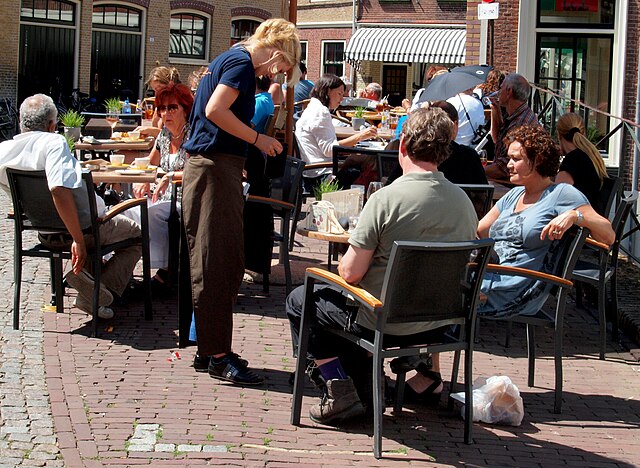By: Liam Cooney | Public Relations Coordinator
There is no industry begs its employees to earn every penny they make more than the restaurant business. Whether someone is hosting, a part of the kitchen staff, a barback, bartender, or a server, they earn every cent that they leave with on that particular night.
Well, at least in theory. The statement above is likely true, unless you find yourself working in a restaurant where “pooled tipping” is the norm.
Pooled tipping is a concept that leaves every employee with the the same amount of tips at the end of every shift. This means that at the end of each and every shift, each and every server will leave with the exact same amount of tips, no exceptions.

I had plenty of experience with this concept this past summer, as I worked as a server at the Smokehouse Restaurant on Scott’s Wharf, in the heart of downtown Newport and a part of Newport Restaurant Group’s massive portfolio. This summer Smokehouse followed a pooled tipping model, in which at the end of every shift, my co-workers and I would come together to evenly distribute our given gratuity for the day. Not only would this extend the length of time I spent at the restaurant anywhere between five to 60 minutes, but it would create an even greater frustration for myself and others.
While, in theory, this doesn’t seem too tedious or unnecessary, it eventually proved to be a hugely frustrating reality that challenged my personal philosophies.
The perceived benefits behind pooled tipping are that it promotes teamwork among staff, provides individual crew members with more consistent compensation and accounts for section discrepancies within the restaurant setting. For example, Smokehouse, has an indoor and an outdoor section for seating. On some days, the outdoor section is more desirable, but others it is less so (weather is the biggest variable here). Pooled tipping is in theory a mechanism to counter-attack this inequity.
The drawbacks for pooled tipping, however, do not need to be as academic in nature, because they are real, and in my experience and personal opinion, as real as it gets.
To put it bluntly, I believe that pooled tipping is a form of socialism within the restaurant industry. It is a method of compensating house staff that directly challenges traditional methods of individual tipping, and promotes a counterproductive system in the workplace and exudes an ideology of anti-American socialism in restaurants.
This past summer, the most frustrating part I found in this system wasn’t on the nights when I left with less money than I contributed to the greater tip pool. It was when I left with more than I contributed that I felt the greatest level of frustration. When a party of guests leave your table, you wish them well, and unapologetically check to see how much was left as a tip. It is of course the hard work you just put in for an hour, plus, that earned you whatever was left on the bill (hopefully 20% or greater). On those nights when I left with more than I should have earned, meaning, my peers generated more than myself, I felt an intense level of guilt and general frustration.
Picture one of my co-workers, on a slower night, struggling to maintain a party of 12 for someone’s birthday party on a random Tuesday. That same night, I had a party of 2 for my table. Almost certainly, the bill, and then very likely, the tip, would be substantially larger for that party of 12. However, what if I told you that both myself (party of 2) and my co-worker (party of 12) would earn the same amount of money for completing those two greatly different tasks, in terms of their difficulties? Yes! A wild concept.

I want to be clear, there is absolutely nothing illegal about pooled tipping. I simply believe that there should be rules and regulations about its implementation beforehand. The Fair Labor Standards Act (FLSA) — which governs everything from a fair workweek to minimum compensation — sets rules and standards that all businesses must follow if they want to implement a tip pooling procedure.
This was explicitly the case when signing on for Smokehouse this summer. In the interview process, it was made clear to me that “pooled tipping” would be the norm. I certainly appreciated this heads up, and while it made me reluctant to accept the position, I still felt it would be a summer job that I could earn good money from, enjoy, and gain valuable experience in. All three came to be true. What I aim to express in this article, however, is the philosophical disagreement I have with pooled tipping to begin with.
Enough about me though, to gain some further insight into what others think, I conducted interviews with two other college students, both of which have even greater experience in the restaurant industry than I do.
One of my co-workers this past summer at the Smokehouse, Holiday Awe, is a junior sports media and communications student at the University of Rhode Island. Hailing from Matunuck, RI, she spends much of her time in Newport. Now 20 years old, Holiday has worked in the restaurant industry since she was 14, working her way up from busser to server.
When I asked Holiday about her feelings about the pooled tipping model, she gave mixed reviews. “If your section happened to be slower than others on any particular day, it was nice to know you’d still be leaving with a substantial amount of money. However, on the flip side, when you are the server that has the busier sections, it can be frustrating to accept that all of your hard work is benefiting other people that didn’t do much. There would be nights where I would make almost $500 independently, and after pooling, would leave with less than $300.”
Next, we have a glimpse into the mind of a server who comes from a more “traditional”
restaurant tipping system. In speaking with my good friend and teammate, Gavin Johnson of Moorestown, New Jersey, Gavin expressed to me me that he considers restaurants to still be a “cooperative” environment, especially within his job at The Red Parrot, using traditional tipping methods.
Gavin told me that for any new server at the Red Parrot, the more tenured staff “does not hesitate to help you out.” This is even with the traditional tipping method when you yourself are earning only the money that you make. Gavin began his career in the service industry as a crew member at McDonald’s during his senior year of high school. He then worked as a busser in Atlantic City before spending the past two summers as a server at the Red Parrot in Newport.
When I asked Gavin about his thoughts on pooled tipping, he was quite against the idea. “A majority of staff members I have talked to at a restaurant that pool tips do not enjoy it. I have been fortunate enough to not have to deal with it. I believe that if the Red Parrot moved towards pooling tips it would incentivize people to work less hard.”
With his experience in a restaurant that does not utilize pooled tipping, Gavin has a unique and valuable perspective. At the end of a shift, he leaves with the money that he has earned. He was so against the idea of it that he said if the Red Parrot moved to a pooled tipping model for its house staff, that he would consider finding a new job.

I could not agree with this statement more. While I enjoyed my job this past summer at the Smokehouse and met some great people, the vast majority of whom brought positive contributions to the workplace, I will not ever be working under a pooled tipping model again. It was the frustration of losing money, or the guilt of leaving with too much, that will keep me away from any other restaurant that follows a similar formula.
The larger question here is why is pooled tipping a practiced method, and is it gaining popularity? According to a 2022 Poached survey, 43.8% of participants said their workplace pooled tips (Poached, 2024). Some local restaurants that would fit into this category would of course be the Smokehouse, plus Stoneacre Garden and the Wharf Southern Kitchen. A severe number of servers are against pooled tipping as a practice. A recent 2023 Pew Research Center survey resulted in a measly 14% of the nearly 12,000 respondents said that the fairest method of tip distribution is a tip pool that includes all restaurant staff (HR Dive, 2024). I think any reader can now agree that my argument for the fairest method of tip distribution would be for every server to leave with the money that they earned at the wend of every shift.
By now, I have made my feelings clear. Pooled tipping is not a practice I wish to work in any more, and one that the vast majority of the general public is also against. It is a version of socialism in the workplace, that directly challenges the traditional restaurant server based status-quo of earning what is left at your table. While there are theoretical positives to this method, in actual real-world practice it leaves most house staff frustrated with feelings of unfairness. I will not be working in anymore pooled tipping restaurants, and I recommend that you don’t either.
Photos from WikiCommons.














